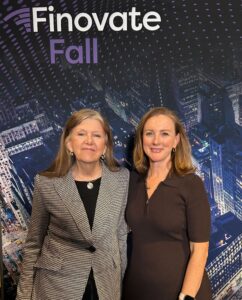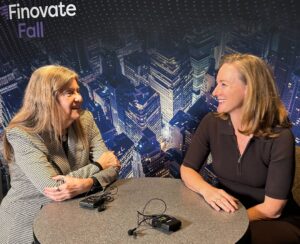October 17, 2024

Data is the raw material of our digital world. How it should — and should not — be used, by whom, for what, and for how long, is one of the most critical questions in public policy. It's also one of the most difficult, because it’s one of those questions where good and bad outcomes are tangled up together, making it very difficult to enable good things, without taking the risk that you’re also enabling bad ones. This dilemma has been wickedly complex for a long time, and that difficulty is now compounding, due to the emergence of new forms of AI.
My guest today has grappled for years with how to sort out this tangle. She is Jane Barratt, Chief Advocacy Officer and Head of Global Public Policy at MX Technologies, Inc.
Jane joined me because the United States is about to adopt game-changing regulations on financial data and privacy. The Consumer Financial Protection Bureau is set to issue a final regulation this month to implement Section 1033 of the Dodd-Frank Act, the law enacted to address the regulatory failures leading to the Great Recession. (Note that Jane and I talked shortly before the rule was finalized, and it’s actually possible that posting this show will cross with it being issued.)
Dodd-Frank was enacted in 2010 — so 14 years ago. One of the first things Jane points out is that the issues around personal financial data have changed massively in that time. While many other countries passed laws on data use and privacy years ago, the U.S. has taken its time.
In our conversation Jane explains what the new rules will require, and the timetable for implementation, which will be short for large banks and long for small ones. She outlines the principles that the CFPB is seeking to follow and about the scope of the rules, which is relatively narrow. She also highlights some unresolved issues that were still outstanding as of the time we recorded this show. Among these, she points especially to secondary use of the data, noting that if we limit data collection and usage strictly to the purposes the consumer has authorized, we may close off other uses that would actually be beneficial.
Jane also talks about how the industry will be impacted by the new rules, including likely effects on small providers versus the large incumbents that already have vast amounts of data in hand. She particularly points out the changes ahead for small banks and credit unions, most of which rely on core processing vendors and have only limited ability to use data and connect via API with third parties that can provide their customers with open banking options. The new rule is likely to bring tremendous change to their businesses.
More fundamentally, Jane talks about the impacts of the 1033 rule on consumers. She and I do some blue sky thinking about the possibility that, with the advent of new, powerful forms of AI, it may actually become possible for consumers to manage their financial lives in entirely new ways, with AI agents helping them perform tasks, select products, and build financial health. We can imagine a system in which consumers, themselves, actually control the uses of their data. It may even become possible to move toward a system in which they are compensated by businesses that want to use their data. That idea has been discussed in theory for years, but has never been practical to implement. AI may change that.
Jane and I recorded our conversation on the sidelines at Finovate Fall in New York last month, where we both were speaking. It was a great event and, as you would expect, practically every session talked about data and AI. The financial world is on the brink of enormous change.


Jane Barratt is Chief Advocacy Officer and Head of Global Public Policy at MX. Jane is a personal finance expert and champion of financial strength. In her role, Jane collaborates with financial institutions, regulatory bodies, policymakers and the financial ecosystem to ensure people have better financial outcomes through permissioned and secure data-driven innovation. She is a financial educator through LinkedIn Learning.
Prior to MX, Jane was CEO of GoldBean, an education first investment advisory platform. The previously spent two decades driving growth for Fortune 500 companies.
We have wonderful episodes coming up. We have an episode with Saket Narayan of Amazon, discussing modern technology applications required by regulators. We’ll have a fascinating conversation with Soups Ranjan of Sardine, on fraud (AIR is doing several major projects on fraud). We have a show coming up with Daniel Gorfine of Gattaca Horizons, talking about our upcoming white paper on Early Wage Access and how it fits into broader fintech innovation and consumer’s financial lives. And we’ll be talking with Google about our second paper with them on Model Risk Management (MRM), focusing this time on (what else?) AI.
It was great to see so many fans of the show at FinovateFall last month, and I look forward to seeing many more at the National Bankers Association’s Annual Conference — where we’ll also record a podcast with CEO Nicole Elam. Then it will be on to Money 20/20, and, of course, the Singapore Fintech Festival.
Please be sure to leave us a five-star rating on your favorite podcast platform so more people can find Barefoot Innovation, and please also find me on social media to continue the conversation!
Stay informed by joining our mailing list
